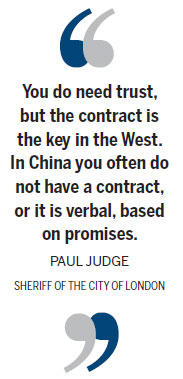Blending Confucius with Aristotle
Updated: 2014-06-13 08:01
By Cecily Liu (China Daily Europe)
|
|||||||||||
|
Judge says it is best to use both trust and law, and the West can learn more about the importance of relationships from China. Cecily Liu / China Daily |
UK Business leader's tips on making relationships work the Chinese way
Making the effort to build long-term relationships with Chinese investors can help British companies unlock more opportunities, says British millionaire and city veteran Sir Paul Judge.
Judge, Sheriff of the City of London, but more famous for being the key benefactor of the University of Cambridge's Judge Business School, says building trust is an inherent part of the Chinese business mentality.
"People in China want to get to know each other before they really do serious business. It is much more important in China than here in the West, where you may just do business with somebody you have met via email.
"In China, of course, you write a lot of emails, but the personal interaction again is much more important, which has a lot of strengths to it, I think."
Judge, a former director general of the Conservative Party and chairman of the Royal Society of Arts, has had a multifaceted business career.
After 13 years with Cadbury Schweppes, he led the buyout of that company's food operations to form Premier Brands, becoming its chairman. He later held many public and private appointments, and represents many UK companies and associations even today.
Given his influence in the British business world, Judge is now taking on a new challenge, that of connecting businesses in the UK and China.
Believing that UK businesses are missing opportunities to work more closely with their Chinese counterparts, Judge and his long-time friend Sir Richard Heygate together established the 88 initiative, a venture designed to initiate more deals. The network had its first meeting last year.
The idea is to connect UK financiers and entrepreneurs with young Chinese entrepreneurs in the UK who are very well connected to an older generation and more wealthy entrepreneurs.
As the older generation of Chinese entrepreneurs spoke little English and knew little of international markets, they may have been reluctant to invest in the UK, but trust with the younger generation Chinese entrepreneurs may change all that.
The team named the initiative 88, as eight is considered lucky in Chinese culture, and is the number of Judge's apartment in central London next to the Thames.

"We set up the 88 initiative to facilitate Chinese people meeting investors or entrepreneurs in the UK and get the exchanges going," Judge says.
"A lot of Chinese entrepreneurs buy companies here in the UK with the intention to take them to China. They can take the brand names to China, and extend them geographically."
He cites two high-profile examples: the UK luxury menswear company Gieves & Hawkes, which the Hong Kong property developer and garment manufacturer USL Holdings Ltd bought in 2012, and the UK department store House of Fraser, which Sanpower Group of China bought this year.
Judge says relationships, or guanxi as the Chinese call them, are important in China's modern society partly because the country's legal system is not yet as robust as those in Western economies, meaning business partners will try everything to avoid court resolutions to their problems.
"The courts in China are very slow when it comes to processes, so it is more important to know the person than it is probably in the West. In the West we have a strong legal profession. No matter which contract you are signing, it is all detailed, everybody understands what is going on, and if it is less likely to have a problem. But if there is a problem, you can go to court."
One example is buying a house, and in the West the buyer often does not meet the seller. After viewing the house with an agent and signing the legal document, the deal is done, Judge says.
Of course it is good to build trust and relationships, but in Western business that is seen as a bonus rather than a necessity.
"You do need trust, but the contract is the key in the West," Judge says. "In China you often do not have a contract, or it is verbal, based on promises."
But the lack of a robust legal framework is not the only reason for guanxi, he says. Rather, the importance of human relationships and understanding has been ingrained in Chinese culture since ancient times, signified by the teachings of Confucius.
The Confucian way of thinking examines in great detail human relationships, with the emperor and parents at the top and citizens and children as secondary, whereas Western philosophers such as Aristotle are much keener observers of nature, Judge says.
"So we have this very big difference between China and the West because the West is more Aristotle -like and China is more Confuciuslike."
When ancient philosophy is translated into today's terms, it means Chinese people do business over meals, but lunch and dinner is not used to talk about business, Judge says. Rather, it is a way of getting to know one's business partner as a person.
And because trust has been ingrained in Chinese people's view of the world since ancient times, it is hard for Chinese entrepreneurs to adapt to the Western way of doing business even when they know the strength of contracts in the West.
"When people come overseas, guanxi comes back. They will deal with people they have met and trust. They may not completely believe in the legal system and other checks and balances, so I think their instinct remains to meet and get to know people."
Judge believes the West can learn more about the importance of relationships from China, as he believes it is best for trust and law to go hand in hand.
"I think there are often issues that arise afterwards if you buy something. In addition to this, you want to know that you buy it from a trustworthy person, so there is nothing hidden, and you may want the person to stay on as a consultant afterwards to help smooth the transition."
Other lessons the Western business world can learn from China are the ideas of long-term views and loyalty to one's company, he says.
Chinese tend to take a longer-term view of business, and they are often more loyal to their companies and change jobs much less frequently than people do in the West, so it ensures continuity for the business.
"One of the reasons for this in China might be that China is more community-based while the West is more individual-based. So there is a tradeoff between individuals and society. Chinese are more loyal to where they are. This might not be necessarily good for the person but it is good for the company to have less disruption."
In addition, Judge says he is impressed with the hard working and motivational attitude of Chinese people, after observing young Chinese in the UK.
"They are very hard working, very intelligent, and very capable. They look for opportunities all the time, they are open to suggestions and ideas and are very dynamic."
Philipp Neumann contributed to this story.
cecily.liu@chinadaily.com.cn
(China Daily European Weekly 06/13/2014 page32)
Today's Top News
China finds way to play in 2014 World Cup
Protocol targets sex violence
Premier all business on Europe trip
Poland-China train on maiden trip
Iraq facing 'mortal threat' from militants
China, Italy boost ties
Brazil averts strike before WCup
Red meat 'linked to cancer'
Hot Topics
Lunar probe , China growth forecasts, Emission rules get tougher, China seen through 'colored lens', International board,
Editor's Picks

|

|

|

|

|

|






